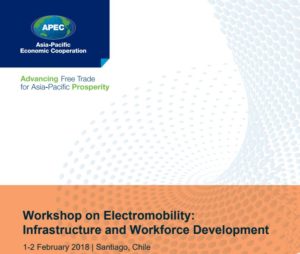
The APEC Workshop on Electromobility: Infrastructure and Workforce Development was proposed in order to support the deployment of Electric Vehicles (EVs) by closing knowledge gaps and promoting dialogue on infrastructure and workforce development. The Workshop was a two-day event focused on sharing information related to EV infrastructure and human capital development, individual economies’ best practices and EV development plans and regulations, as well as APEC’s work in this area.
Based on the presentations and discussions during the workshop, the organizers would like to highlight the several general conclusions.
The level of knowledge and development with regards to the topics covered in the workshop is very diverse among the different participating economies, therefore, it becomes very important for the APEC economies to generate instances of collaboration. In this manner, those economies that lead the technological advance towards electromobility or have implemented innovative policies could share experiences and good practices around the path traveled and the challenges involved in the large-scale implementation of this technology.
The advance in the technologies presented regarding electric vehicles and infrastructure for battery charging makes it clear that technologies already exist and that they improve day by day. Therefore the future stages for the widespread use of electric vehicles will be strongly related to public policies with regulations or incentives according to the reality of each economy, as well as the impulses given by private and public companies, especially regarding accessible prices in the purchase of vehicles.
The links to speakers’ presentations are included in the annex to this document and provide information in greater detail.
Infrastructure
Analysis indicates that electric car uptake is strongly linked to policies, as well as to infrastructure development. Critical factors discussed during the workshop include the extension of charging infrastructure, standardization, vehicle range, battery technology and smart charging for grid stability. APEC economies have much to share in this regard, as highlighted in the presentations by speakers from Mexico, Chile, PetroChina Planning and Engineering Institute (China), CHAdeMo (Japan) and MITO (New Zealand). The International Energy Agency also produces materials that address these crucial areas.
Human Capital
With regards to the formation of technicians and professionals, the importance of the development of an appropriate and updated curriculum, as well a close link with industry in order to ensure the relevance of training was highlighted. New Zealand’s experience in gender and human capital also emphasized the importance of factors that encourage and support the participation of women in these fields, including mentors and cultural recognition.
With regards to gender, the Chilean experience in the capital city of Santiago indicates that there are significant differences between the purposes, schedules and travel experiences of men and women. Furthermore, analysis indicates that passengers in Santiago’s public transport system especially valued the qualities of female bus drivers. This information is important to consider in policy development.
Industry participants were impressed by the wide range of participating economies, which were able to present their strategies to promote electric cars. It was considered a good event, covering a range of relevant topics, such as infrastructure, power generation, personnel training, security, financial incentive plans, creation of public fleets and others.
Based on the information collected in the participants’ evaluations, potential areas for future APEC initiatives in this area include:
- To continue the networking and cooperation workshops, including a partnership for education and training initiatives across APEC economies.
- To continue sharing policies, regulatory frameworks, strategy and goals to encourage electromobility, with regulatory updates as well.
- Sharing information on technical developments, including automotive manufactures and batteries.
- Organizing a future workshop about smart grids, as well as a workshop on these same topics in two years with updated information.
- Closer links to APEC fora and possible collective actions.
This highlights the importance of collaboration among APEC fora, as well as the efforts of the Automotive Dialogue.